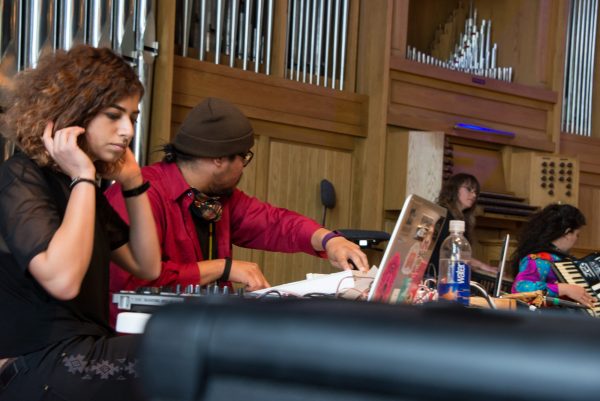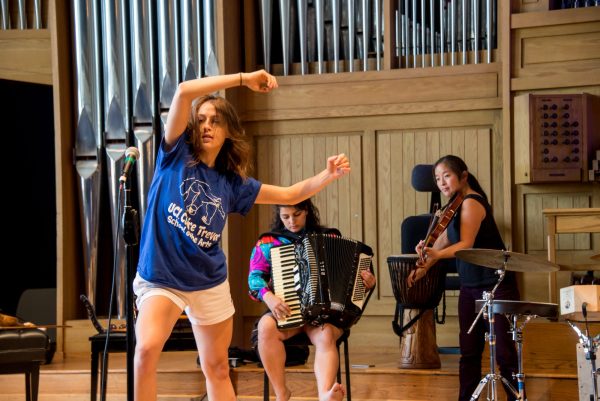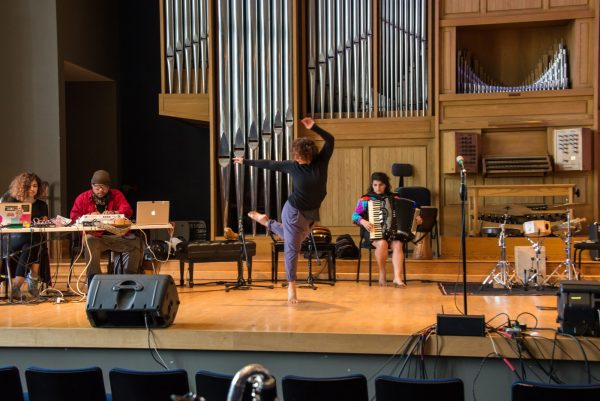 By Tyler Stup, SMTD Publicity Intern
By Tyler Stup, SMTD Publicity Intern
As the lights dim on the Lincoln Center’s Magnolia Stage, four people remain lit. They are musicians and activists prompted by two questions. “What do you feel is the role of music in sustaining and reimagining cultural identity and traditions? And why is that important for you on a personal level?”
Mehdi Nassouli of Morocco, tells the story of gnawa music and its role as a form of therapy. A fellow from Taiwan says music encompasses his cultural heritage, conveying the teachings of past generations and the beauty of aboriginal Taiwanese culture. Rayhan Sudrajat, an ethnomusicologist from Indonesia, uses music as a way to connect some dots between the 17,508 populated islands that make up the country. It’s a diverse grouping of answers and people. But for OneBeat, that’s the point. The Brooklyn-based nonprofit seeks to employ original and global music as a potent new form of cultural diplomacy.
After they answer the question, they perform. The first performance is comprised of Sudrajat and Cary Morin playing a song combining blues guitar and sitar. And after they’re done, a sold-out room of around 200 people greets them with raucous applause.
As they leave the stage, they’re laughing and hugging each other. In fact, every performance ends with a hug. By this point, the OneBeat fellows have known each other since traveling through Oregon, Idaho, Wyoming, and Colorado. And if the smiles and hugging doesn’t make it obvious that they’re close, the music does. Not only do they play well together, they create together. Throughout the evening, we heard stories and accounts of activism (and music’s role within), but we also hear that “this song was just made in 24 hours.” Or, “This is a song they’ve been working on for the last couple weeks or so.”
 Due to the nature of OneBeat’s fellows, those 24 hours – or a week – results in unique blends of music between the Crow Tribe and Indonesia; Kyrgyzstan and Colorado; Jordan and Egypt; and more. By the time the presentation finishes, I’ve enjoyed music uniting musical styles and instruments I’ve never had the chance to hear played in person. All of the OneBeat fellows are extremely talented individuals who come from all over the globe. They are musicians who have traveled internationally, and work to preserve culture and fight social injustices. Listening to their collaborative music gives an interesting peek into cultures and lives far away.
Due to the nature of OneBeat’s fellows, those 24 hours – or a week – results in unique blends of music between the Crow Tribe and Indonesia; Kyrgyzstan and Colorado; Jordan and Egypt; and more. By the time the presentation finishes, I’ve enjoyed music uniting musical styles and instruments I’ve never had the chance to hear played in person. All of the OneBeat fellows are extremely talented individuals who come from all over the globe. They are musicians who have traveled internationally, and work to preserve culture and fight social injustices. Listening to their collaborative music gives an interesting peek into cultures and lives far away.
At the beginning of the evening, the Music District host summarized the organization’s mission. OneBeat endeavors to be the nexus of a new way of thinking about how music can help us collectively build healthy communities, prosperous societies, and a more peaceful world. This leads to a belief that original music can be a vehicle for crossing cultural and political divides. Each year, OneBeat selects 25 fellows to perform on a short tour to help them with that mission.
And with as much sentiment as that carries, I’m pleased to actually believe that OneBeat is acting on it. During their residency, the fellows have travelled through the western United States teaching workshops, but also meeting with minds involved in activism and social movements. Towards the end of the night, one fellow jokingly adds that she told her mom that this month has been equivalent to knowledge gained by her master’s degree.
As the fellows ended their four-week residency in Fort Collins, the musicians brought their knowledge and musical expertise to a plethora of events around town. The group put on a variety of workshops and rare opportunities that occur when talented musicians are given trust and the artistic freedom to work on things they truly care about.
 With help from the Music District, the University Center of the Arts, Colorado State University, and 13 other sponsors, OneBeat engaged people on a community-wide scope. Those interested in film were treated to Godfrey Reggio’s Koyaanisqatsi with a completely new live score composed by the 2017 class. Hip hop enthusiasts, book worms, aspiring songwriters, music appreciators, and more were able to draw upon the knowledge and life experiences of 25 artists from 18 countries with radically different backgrounds.
With help from the Music District, the University Center of the Arts, Colorado State University, and 13 other sponsors, OneBeat engaged people on a community-wide scope. Those interested in film were treated to Godfrey Reggio’s Koyaanisqatsi with a completely new live score composed by the 2017 class. Hip hop enthusiasts, book worms, aspiring songwriters, music appreciators, and more were able to draw upon the knowledge and life experiences of 25 artists from 18 countries with radically different backgrounds.
Next year’s fellows will not be the same people, but the OneBeat mission will remain the same: striving to bring people together under the umbrella of music, empathy, and the once-in-a-lifetime conversation that happens when good musicians, activists, and audiences get together.

